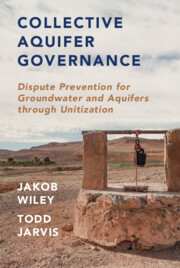Refine search
Actions for selected content:
6 results
Chapter 3 - Search and Detection
-
- Book:
- Human Memory
- Published online:
- 17 January 2025
- Print publication:
- 19 December 2024, pp 51-88
-
- Chapter
- Export citation
11 - Serious Gaming and Unitization
-
- Book:
- Collective Aquifer Governance
- Published online:
- 20 January 2022
- Print publication:
- 03 February 2022, pp 141-161
-
- Chapter
- Export citation
4 - Unitization and Collective Aquifer Governance Agreements
-
- Book:
- Collective Aquifer Governance
- Published online:
- 20 January 2022
- Print publication:
- 03 February 2022, pp 47-64
-
- Chapter
- Export citation
1 - Introduction
-
- Book:
- Collective Aquifer Governance
- Published online:
- 20 January 2022
- Print publication:
- 03 February 2022, pp 1-14
-
- Chapter
- Export citation

Collective Aquifer Governance
- Dispute Prevention for Groundwater and Aquifers through Unitization
-
- Published online:
- 20 January 2022
- Print publication:
- 03 February 2022
4 - The Uneven Preservation of Reallocated Private Rights on Land and at Sea
-
- Book:
- Non-State Actors' Rights in Maritime Delimitation
- Published online:
- 15 June 2021
- Print publication:
- 08 July 2021, pp 96-135
-
- Chapter
- Export citation
